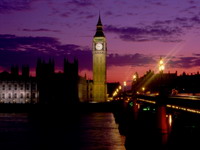British Empire to claim part of land offshore according to UN treaty
The British Empire is again trying to extend its reach. This time the prize could be large sea beds in the Antarctic and the Atlantic Ocean.

The land grab is part of a U.N. treaty that allows coastal countries to claim a continental shelf up to 350 nautical miles (645 kilometers; 380 miles) off their shores, and the right to search for oil and natural gas there.
Britain is one of nine countries that already have filed such claims, and more are expected, but the Antarctic claims are likely to be among the most contentious.
The claim on the seabed would extend from the boundaries of the British Antarctic Territory - land Britain first claimed in 1908. The claim to extend British sovereignty in Antarctica could spark disputes with Argentina and Chile, which are likely to make overlapping claims in the region.
If the UK and other nations go ahead with claims in the Antarctic, they could violate the 1959 Antarctic Treaty and related agreements which set aside the continent as a scientific preserve and prohibited all activities relating to mineral resources except scientific ones, said Robin Churchill, a professor of international law at Dundee University in Scotland.
"I think there's potential for a huge conflict here," Churchill said. "The worse case scenario is that this dispute could lead to the end of the Antarctic Treaty itself, which I think would be a tragedy. The Antarctic Treaty has prevented disputes over the Antarctic and it's been a framework for a huge amount of scientific research and research into the ozone layer."
Other experts suggest the Antarctic should be treated differently than other claims.
"The Antarctic has long been recognized as a special continent that should be protected from exploitation and overdevelopment," said Martin Pratt, a specialist on international boundaries at the University of Durham in northern England. "The planet is under threat in so many ways, including global warming. This last wilderness should be left alone."
John Sauven, executive director of Greenpeace-UK, said Britain's plans are not in keeping with its claims that it will fight global warming. Only six months ago former Foreign Secretary Margaret Beckett raised climate change as an issue with the U.N. Security Council, he said.
"The same Foreign Office is claiming ownership of one of the world's last remaining pristine wildernesses to drill for more fossil fuels," Sauven said.
Under article 76 of the U.N. Convention of the Law of the Sea, which came into force in 1994, coastal countries have 10 years after they ratify the treaty to claim a larger portion of a continental shelf. Earlier treaties allowed countries to claim only territory only 200 nautical miles (370 kilometers; 230 miles) from the coast.
So far, nine coastal countries have submitted claims to the U.N. Commission on the Limits of the Continental Shelf: Britain, Russia, Brazil, Australia, Ireland, New Zealand, France, Spain and Norway. The commission will rule on each application.
The U.S. never approved the treaty but hearings on it are under way in the U.S. Senate, a U.S. State Department official said Wednesday. Scientific research already has been conducted in at least eight areas where the U.S. may seek to expand its control, but they don't include Antarctica, the official said on condition of anonymity because Senate hearings into the matter were still ongoing.
On Wednesday, a spokesman for Britain's Foreign Office said it plans to submit five territorial requests before its May 2009 deadline, including for a large seabed around British Antarctica near the South Pole. The spokesman spoke on condition of anonymity in line with government policy.
Other claims include the seabed near the Falkland Islands, 8,000 miles (12,800 kilometers) from the British mainland.
The status of the British-run Falklands is hotly disputed by Argentina, which also claims sovereignty and fought a war over the territory in 1982.
Britain's other claims would be for:
-Around Ascension Island, a volcanic island in the South Atlantic that is a dependency of the British overseas territory of Saint Helena.
-Near the Bay of Biscay in the North Atlantic that lies along the western coast of France and the northern coast of Spain. Britain believes it is entitled to claim northern parts of the continental shelf.
-The Hatton-Rockall basin off Scotland's coast. Rockall is a tiny, uninhabited rock 200 miles (320 kilometers) off the Scottish coast.
Subscribe to Pravda.Ru Telegram channel, Facebook, RSS!


